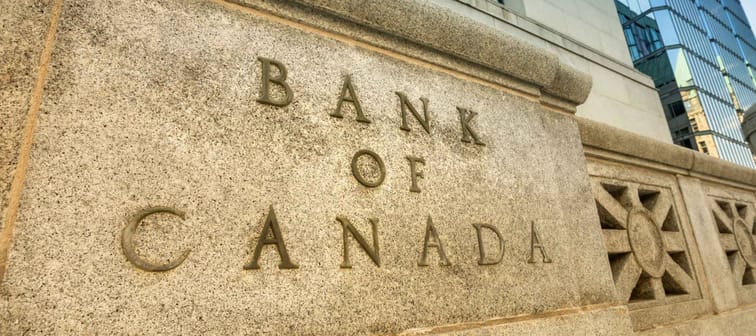What the Bank of Canada had to say

The Bank of Canada feels holding down the overnight rate — that’s the interest rate banks charge when they lend each other cash — is still a necessity at this point in the country’s recovery.
Even though economic activity in the first quarter of 2021 was “considerably stronger” than what the Bank had forecast back in January, a fresh wave of lockdowns in April eroded employment gains and prevented consumer spending from getting back on track.
“The virus and lockdowns have had very different impacts across sectors, businesses and groups of workers, creating an unusual degree of uncertainty about the amount of slack in the economy and how long it will take to be absorbed,” the Bank of Canada said in a statement.
The Bank also reported that it will continue purchasing government bonds at a rate of $3 billion per week. The move will help prevent the kind of surge in inflation that could make an unexpected rate hike necessary, Dominion Lending Centres’ chief economist Dr. Sherry Cooper says.
The Bank expects inflation to continue being an issue in the short-term. Inflation is currently hovering around 3%, largely because of the discrepancy between today’s prices and the much lower prices that resulted because of the pandemic last year. The BoC projects that inflation will recede back toward 2% over the second half of the year.
That 2% inflation target is key. Until a 2% inflation rate is “sustainably achieved,” the Bank says, the overnight rate will stay at 0.25%. That’s not expected to happen until the second half of 2022.
That’s good news if you have a variable-rate mortgage. A static overnight rate means no new upward pressure on Canadian banks’ prime rates. And if the prime rate doesn’t move, variable mortgage rates shouldn’t, either.
Even so, most homeowners and homebuyers won’t have reason to celebrate. More than 70% of Canadians opted for fixed-rate products in 2020, according to Mortgage Professionals Canada.
How much home can you afford?
Whether you're hunting for a new home or looking to refinance your mortgage, knowing how much your new loan might cost you is critical. Use our handy mortgage calculator to help you understand what your payments could look like.
Get StartedWhy fixed mortgage rates could rise

The Bank of Canada has little control over fixed mortgage rates. Those are primarily determined by activity in the bond market. Simply put, when Government of Canada bond yields increase, fixed mortgage rates tend to increase, as well.
It’s hard to predict the bond market, but a stronger economy typically juices the value of government securities. If the economy takes flight and investors see higher returns on their bonds, fixed mortgage rates will continue increasing.
“While the Bank of Canada’s rate has remained at historic lows since early in the crisis, mortgage rates rose, and then they fell, and now they’re rising again,” Phil Soper, CEO of Royal LePage, tells Money.ca.
That said, Soper doesn’t see fixed rates spiking any time soon. In addition to requiring a certain level of frenzy in the bond market, higher fixed rates also depend on the decisions of lenders.
Some may lower their rates to remain competitive — a strategy the mortgage market saw in 2020, when HSBC advertised a five-year fixed rate at an eye-popping 0.99%. Other lenders may raise their rates because they feel a new offering makes their services attractive enough to warrant a few extra basis points.
“I think we’re up about 35 basis points from the lowest level we saw in 2020,” Soper says. “The five-year fixed rate is still extremely low by historical standards, but up materially from its lowest point.”
Even though the certainty that comes with fixed-rate mortgages is highly enticing, Soper says buyers should still consider taking the variable route.
“Especially for younger buyers, my advice is to take a hard look at shorter-term, variable, open mortgages,” he says. “They typically, over the long, long term, are materially cheaper than five-year fixed mortgages. If interest rates were to rise rapidly, they could be more expensive. But history has shown that that doesn’t happen very often.”
Regardless of what’s happening in the market, the lowest mortgage rates typically go to borrowers with the strongest credit scores. Anyone interested in buying or refinancing should get theirs checked for free and see whether it needs improvement.
Soper remains bullish on the future of Canadian real estate. Even with supply increasing as eager sellers look to fetch a great price in a more-or-less post-pandemic market, there’s simply too much unmet demand for housing prices to fall — and that’s before an influx of new Canadians and returning international students begin arriving.
“Right now, sales volumes are very high — unusually high,” he says. “That, I believe, will continue for about another year.”
You're 5 minutes away from the best mortgage
Searching for your perfect mortgage shouldn’t be hard. Homewise is an online brokerage that will negotiate on your behalf with more than 30 big banks and other lenders, completely free, and it only takes five minutes to apply.
If you're in the market for a new mortgage, or if you're looking to refinance before interest rates rise again, go to Homewise now and answer a few simple questions to get started.








